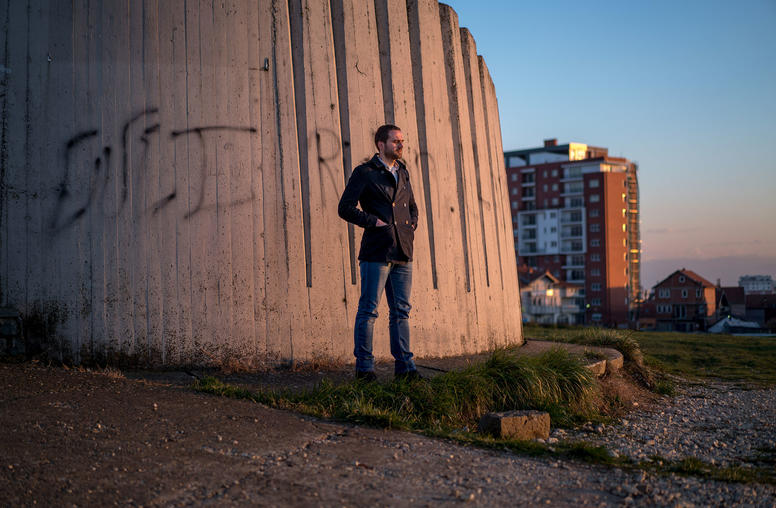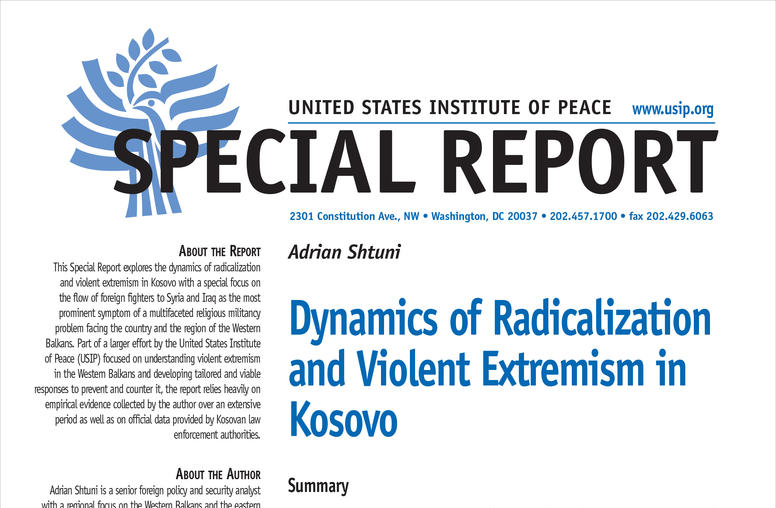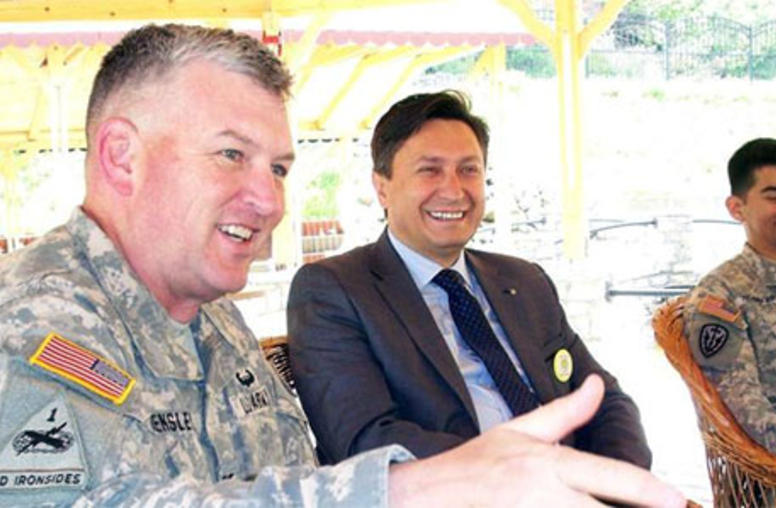The Future of Kosovo
Congressional Testimony by Dan Serwer, director of the Balkans Initiative.
The day has clearly passed when either Serbs or Albanians could hope to force a solution in Kosovo by military means. Neither the increasingly democratic regime in Belgrade nor the UN-founded provisional institutions of self-governance in Pristina would want to endanger their own futures by threatening or using force and NATO will not be able to leave until Kosovo's final status is decided. However, what can the United States and the international community do to help resolve outstanding questions on Kosovo final status?
On May 21, 2003, Daniel Serwer, director of the Balkans Initiative, testified before the U.S. House of Representatives Committee on International Relations on "The Future of Kosovo."
The following is a summary of his statement made before the committee. The views expressed below are those of the author, not the U.S. Institute of Peace, which does not take positions on policy issues.
It is a pleasure for me to testify today on the future of Kosovo, a topic that the United States Institute of Peace has focused on a good deal for more than a year. In addition to my written testimony, I would like to submit for the record three Institute reports on the subject: Kosovo Final Status: Options and Cross-Border Arrangements, Simulating Kosovo, and Kosovo Decision Time. These papers are based on extensive activities at the Institute with a wide range of participants. I am pleased that Janet Bogue, Joe Dioguardi, Jim O'Brien, Martin Vulaj, and Shirley Cloyes, who are appearing here today, have all been participants in Institute discussions, though our views on Kosovo are diverse.
My personal bottom lines on Kosovo final status are these:
- There is no alternative to a negotiated solution, one to which the authorities in both Belgrade and Pristina agree prior to UN Security Council approval.
- A negotiated solution will not correspond to the maximum demands of either Belgrade or Pristina and will include complicated conditions on both parties.
- Negotiations on final status require preparation, including talks on practical issues between Pristina and Belgrade and consultations between Europe and the United States.
- Talks on final status should start under joint EU and U.S. sponsorship by 2005, with a goal of completing them within two years.
- The United States is an indispensable participant in the decision on Kosovo final status and needs to begin preparing for its role now.
I would like to discuss each of these points briefly.
A Negotiated Solution
The day has clearly passed when either Serbs or Albanians could hope to force a solution in Kosovo by military means. Neither the increasingly democratic regime in Belgrade nor the UN-founded provisional institutions of self-governance in Pristina would want to endanger their own futures by threatening or using force. The NATO troops on the ground ensure continuing self-restraint and counter extremist activities. NATO will not be able to leave until Kosovo's final status is decided.
This can only be done with a new Security Council resolution, one that replaces Resolution 1244, which ended the NATO-Yugoslavia war in June 1999. For a new Security Council resolution to pass, Russia and China will at least have to abstain. Both of these permanent members have their own reasons not to want a province of Serbia to gain independence: it could be viewed as a precedent for Chechnya or Tibet. Only if Belgrade agrees will Russia and China allow a new Security Council resolution to pass. Only if Pristina agrees will the United States allow it.
No One Will Be Completely Satisfied
Thus Belgrade and Pristina each hold a key to the future status of Kosovo. Their initial negotiating positions will be incompatible: Belgrade will claim sovereignty and Pristina will want independence.
Underlying these opening positions will be a more complicated set of interests. Belgrade shows no signs of wanting to govern the Kosovo Albanian population but does clearly want protection for the Serb population and monuments in Kosovo, as well as some degree of governing authority over the Serbs living there. Pristina needs to figure out how the independent Kosovo it wants would ensure its own security with Serbia as its nearest and most powerful neighbor, as well as its most important trading partner.
A solution to Kosovo final status needs to be constructed on the basis of these underlying interests. I do not know what that solution will be, but it will not be simple. There will need to be cross-border arrangements made in advance of any final status decision to fix the relationships not only between Serbia and Kosovo but also between Kosovo and Albania and between Kosovo and Macedonia. The human and property rights of Serbs and other minorities will need to be guaranteed and debt and compensation issues resolved. A residual international presence may be required, especially in the court system and possibly along Kosovo's borders.
Careful Preparation Should Begin Now
Complicated arrangements of this sort require careful preparation. Immediate talks on Kosovo final status are not in my view possible or desirable. First, all the main parties concerned need at least a year of hard work. For Pristina and Belgrade, the hard work needs to be accomplished in talks on practical issues hosted by the United Nations. While their postponement after Prime Minister Zoran Djindjic's assassination was entirely understandable, these confidence-building talks should begin by this summer.
Belgrade seems largely ready. The Serbs will come to the talks politically unified and technically prepared. Belgrade has been resolving difficult issues in the Presevo area of southern Serbia, where Albanians are a large percentage of the population, but it has not established constructive relations with the UN Mission in Kosovo. Specific problems include failure of the Serbs to participate consistently in the Kosovo Assembly and continuing Serb control in the north.
The bigger problem at the moment is lack of Albanian preparation. Pristina still suffers from sharp divisions among the main Albanian political parties. It remains dangerous for a politician to meet with Serbs. Moreover, the Kosovo Albanians have done little technical preparation for talks with Belgrade, and the mistreatment of Serbs in Kosovo will put the Albanians at a serious negotiating disadvantage. The international community needs to help Pristina get ready, and the U.S. Institute of Peace intends to be active in offering negotiation training and other assistance.
The international community also needs to prepare itself. While the United Nations may be ready for talks on practical issues, the United States and the EU continue to try to put off all discussion of Kosovo final status. This is a mistake, one that encourages the Albanians to think they need do nothing to prepare. The United States and the EU should decide their own positions, talk with each other about how their interests can be protected, and design a negotiating process that will lead to an acceptable decision.
The United States and EU Should Sponsor Final Status Negotiations by 2005
I will leave it to government officials to design the process in detail, but it seems to me that the United States and EU should jointly sponsor Kosovo final status negotiations, following the successful pattern that led to the Ohrid framework agreement in Macedonia in the summer of 2001. While the special representative of the secretary general who leads the UN effort in Kosovo—today Michael Steiner—can and should sponsor talks on practical issues between Belgrade and Pristina, he should not be alone in sponsoring final status talks. The United States and the EU must be involved. Kosovo will eventually find its way into the EU, which will therefore need to be satisfied with the outcome. The United States, having gone to war over Kosovo, will likewise need to be satisfied, especially as the precedent set there may find application elsewhere.
While there has been some slippage due to Djindjic's assassination, there are good reasons to begin final status negotiations by 2005. Belgrade by then should have a new Serbian constitution, a new president, and a new parliament. Pristina will likewise have elected a new Assembly and President. It will then be important to show progress on final status in order to avoid unrest and open the road to Europe. No moratorium on discussing final status, as proposed recently in Pristina, can last past 2005.
The United States Is Indispensable
With all the issues the United States confronts today, some would argue that Kosovo final status should be put off indefinitely, or the burden transferred to Europe. Neither proposition is viable. Because of its role in the NATO-Yugoslavia war and its relationship with both Serbs and Albanians, the United States is a vital participant in any decision on Kosovo final status. Europe lacks the credibility and unity to handle Kosovo on its own. My European friends do not disagree with this assessment. To the contrary, they are awaiting a signal that the United States is ready to engage.
This signal could come with appointment of the next head of the UN Mission in Kosovo, a job held since 1999 by a European. If the United States is serious about getting Kosovo ready for final status negotiations, it should put forward a U.S. candidate to head the mission starting this summer. It is an anomaly that Europeans have held the top jobs in both the military and civilian operations in Kosovo. The right American chief of mission would be able to do what the Europeans have not done: convince the Kosovar Albanians that the only way to final status is by correct treatment of Serbs and other minorities.
The Americans are also needed to protect the sovereignty and territorial integrity of Bosnia and Macedonia from the consequences of a decision on Kosovo final status. We should allow no compensation in other countries for anything "lost" in Kosovo final status negotiations.
There is a silver lining for those who want U.S. resources redeployed to regions where U.S. national security is more directly at risk. With a solution for Kosovo will come an opportunity to draw down U.S. troops and leave Balkans military tasks to Europe.
Conclusions
To those with responsibility for Kosovo, I would offer four suggestions:
- The State Department should begin consulting with Europe on Kosovo final status, with a view to outlining by the fall a process that the EU and United States will lead.
- Pristina should prepare for final status talks, forming a coordinating center to deal with Belgrade and ending hostility towards Serbs and other minorities.
- Belgrade should end its hostility to the UN authorities in Kosovo and establish constructive relations, including in northern Kosovo and in the Kosovo Assembly.
- The United Nations should revive its proposal for talks on practical issues, with a view to opening them this summer.
Let me, in closing, also offer a word on the role of the U.S. Congress. The signals you send—by holding this hearing or by introducing H. Res. 11 and H. Res. 28—are heard loudly, but not always clearly, in Belgrade and Pristina. It would have been useful to have a Serb perspective at this hearing, because otherwise the intent of Congress—or at least of some members—may be misunderstood. I would urge you to clarify that Kosovo final status will not be decided on Capitol Hill but rather by the authorities in Pristina and Belgrade, who need to accept their responsibility to negotiate a solution that will enable both Albanians and Serbs to look forward to a much better future within Europe.
Some will say I am unrealistic, that Albanians and Serbs cannot even talk with one other, much less negotiate their own future, even with United States and EU support. My experience says they can. I recently heard from a multiethnic group we trained in Kosovo three years ago at the request of the U.S. Army—they have founded a professional organization and initiated an impressive range of multiethnic activities. The U.S. Institute of Peace has conducted for more than a year and a half, with State Department support, dialogues among more than 100 young Serb and Kosovo Albanian political and civil society leaders. In addition to gaining better mutual understanding, they have embarked on joint efforts to encourage voting, counter organized crime, and break the isolation of Serb enclaves in Kosovo. These young people—not the belligerent voices of their elders—are the future of Kosovo and the region. They merit our support and encouragement as we move ahead.
The views expressed here are not necessarily those of USIP, which does not advocate specific policy positions.



